parasite support
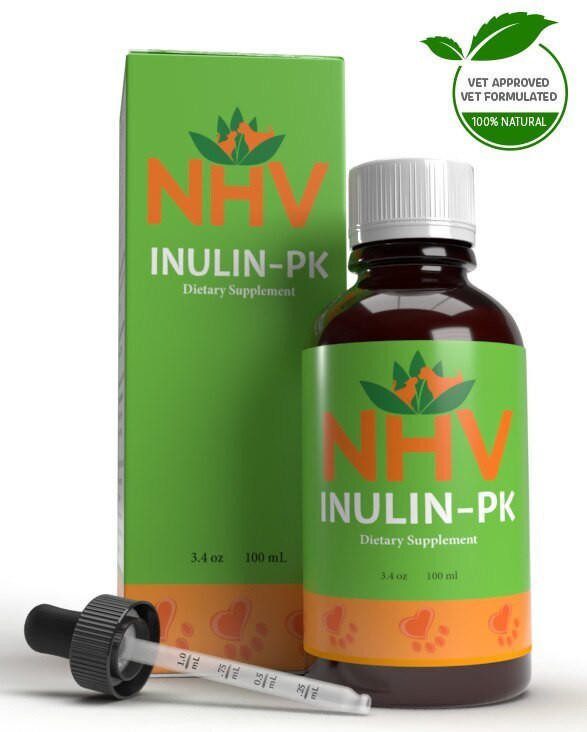
free shipping over $100 (USA & Canada)
1-877-937-4372 the pet expert hotline
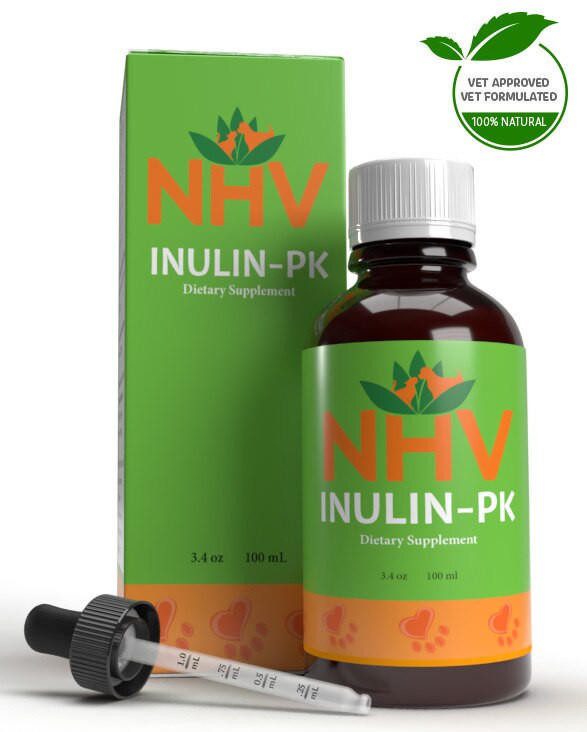

There are many different parasites that our pets are predisposed to in the environment. All cases of intestinal parasites should be treated and diagnosed by a veterinarian. Worms and parasites in cats and dogs can become profoundly serious and often fatal if not treated. Worms and parasites feed off the tissue in the GI tract. These parasites will eventually keep on multiplying when left without any intervention. If these parasites continue to grow, they will continue to feed, causing dogs and cats to slowly deteriorate.
There are some signs to look out for when it comes to diagnosing a worm burden. We have also added a description of some of the most common worms and parasites in cats and dogs.
Roundworms can infect both dogs and cats. They are commonly ingested through the soil and fecal matter that is contaminated by eggs and larvae. Roundworms can also be ingested when pets eat other infected animals such as rats, birds, and insects. The eggs of these worms can be found by examining the feces under a microscope. The problem with Roundworms is that as adults, they can travel to the lungs and cause further issues. They live in the small intestine, where they will grow and multiply and they will eventually cause an intestinal blockage. Unfortunately, Roundworms can be transmitted to people.
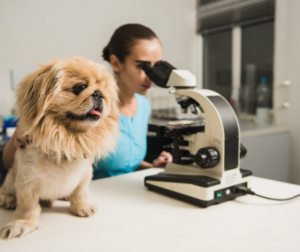
Hookworms can also affect both kitties and pups. They can be ingested but can also infect pets by penetrating the skin and through the paws. Like Roundworms, hookworms can be transmitted to the offspring through nursing and pregnancy. Hookworms are found by microscopic examination of the feces. These parasites will attach themselves to the lining of the intestine and survive by feeding on the hosts’ blood. Hookworms can cause severe anemia and if left untreated, they can cause collapse and death. Pets that have been infected with this worm will show symptoms such as weight loss, runny stools, and bloody stools. They can also be transmitted to people and have been known to cause a skin disorder called cutaneous larval migrants.
Whipworms are small and thin worms. They stay in the large intestines and cecum of dogs (rarely found in cats). They are transmitted by the ingestion of the eggs. The eggs can be in contaminated soil and feces. These worms are not as common as others but can live for up to 7 years in the soil. It can be difficult to test the feces for whipworms as they shed in low amounts and may not be found in the first microscopic examination. They will also cause diarrhea, weight loss, and bloody stools. Whipworms may also cause rectal bleeding which can cause further fatal problems in pets.
Tapeworms are much larger and flatter than most worms. This makes them a lot easier to notice in the stools. Both dogs and cats can be infected. Tapeworms can be ingested when cats/dogs eat smaller rodents or rabbits. They are transmitted by the fleas, as they carry the infective larvae. The tapeworm attaches itself to the small intestine lining. Tapeworms in general will not cause any serious problems for your pet but can cause some tummy upset. They are detected generally by examining the feces and they can sometimes be seen around the anus. Tapeworms cannot be passed from pets to people.
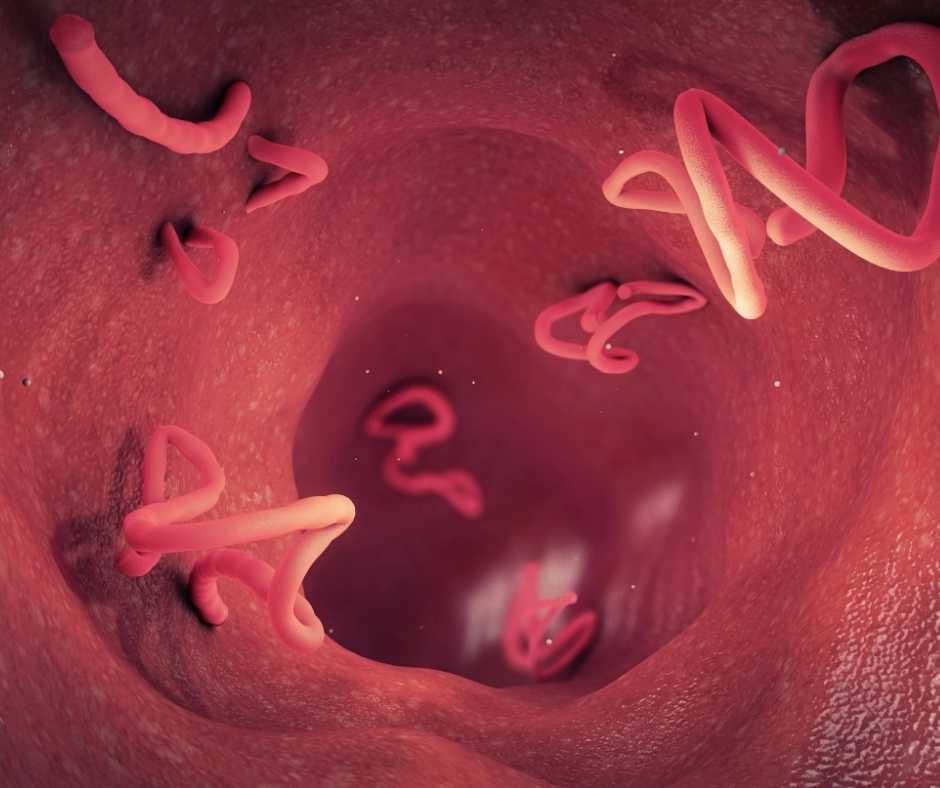
Giardia can be quite common in our pets especially if they enjoy eating things they should not when outdoors. Giardia is not quite a bacterium but rather similar. It is referred to as protozoa. Protozoa’s are organisms that are considered to be a parasite that will multiply and this is what can cause serious infections in the body. Giardia lives in the small intestine of cats and dogs. Giardia can also affect people if ingested through food and water. Symptoms of Giardia include diarrhea, a mucous-like substance in the stools, weight loss, lethargy, dehydration, and they may lose their appetite. Your vet will generally prescribe a certain antibiotic to treat the problem, but giardia can be persistent and very contagious. It is advised to wash your pet, especially if your dog or cat is licking. Ensure that litterboxes, beds, etc. are cleaned using a disinfectant.
The most common signs of a worm burden:
Mothers may also pass worms on to their puppies, so it is important they are treated before the birth of their puppies. If the mother is not dewormed, it is common for their puppies to be born with worms. Because of this, puppies should be dewormed early and regularly, most often at 2, 4, 6, 8, and 12 weeks of age. Once your puppy reaches 12 weeks, you can continue to treat your puppy every three months with an effective dewormer.
Depending on veterinarians’ guidelines, you should deworm your pet regularly as advised. Especially if there is a suspected worm burden.
If your pet has been diagnosed with a worm burden or is suspected to have worms, it is important to keep all areas your pet uses thoroughly cleaned. This includes the litterbox, bedding, and feeding bowls. You should also wash your pup or kitty.
NHV’s herbal formula, Inulin PK, can also be used to help rid the body of worms and internal parasite infestations. Inulin PK acts as a natural dewormer to help control parasites in dogs and cats. It can help to stop any bleeding while also repairing the internal damage caused by intestinal worms and parasites.
To learn more about worms and parasites in cats and dogs, contact our pet experts by clicking the chat button below.
parasite support

Natural Parasite Dewormer for Cats and Kittens
buy 2 and save $3
3 month supply for a small to medium size pet
What is it?
Encourage parasite flushing with a natural cat dewormer while helping repair damage caused by worms and balancing the immune system.
How does it work?
Why trust it?
NHV uses human-grade herbs, so your pet only gets the best.

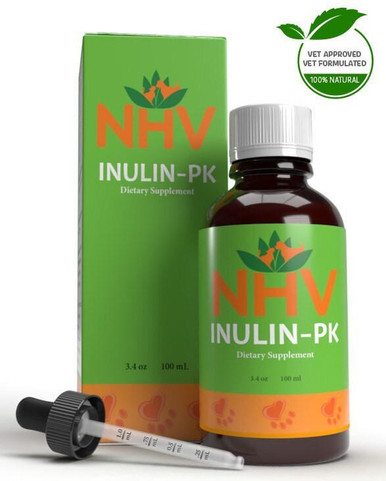
What is it?
Encourage parasite flushing with a natural cat dewormer while helping repair damage caused by worms and balancing the immune system.
How does it work?
Why trust it?
NHV uses human-grade herbs, so your pet only gets the best.

Rid your cat of internal parasites (worms) that can drain your pet’s energy, prevent them from absorbing nutrients from food, and damage the intestinal tract. Inulin PK is a natural cat dewormer designed to control parasites in cats, stop bleeding, and repair the internal damage worms cause.
Common types of worms that Inulin-PK can help support recovery from include hookworm, roundworm, whipworm, and tapeworm. The signs that your pet may be infected include anemia, weight loss, and diarrhea. We recommend first seeing your veterinarian for a diagnosis.
NHV supplements are all-natural herbal remedies that can be safely taken alongside conventional treatment.
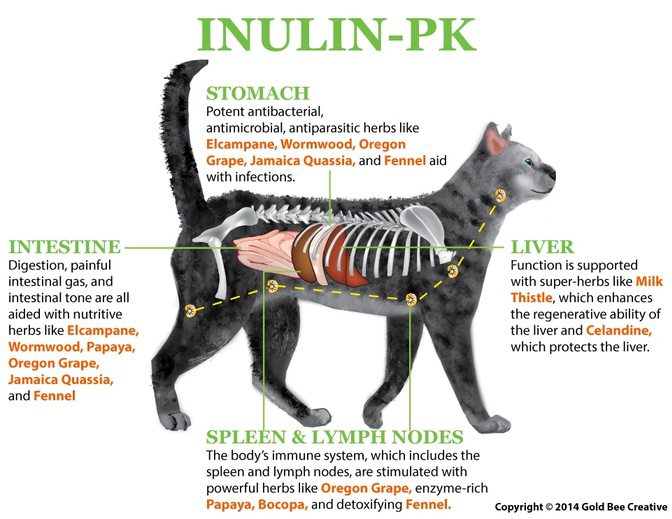
Elecampane – Has a paralyzing effect on the central nervous system of worms.
Wormwood – Expels intestinal worms and parasite infestations.
Jamaica Quassia – Helps expel parasitic worms from the body. Enhances other properties in Inulin PK.
Papaya – Helps dissolve the worm’s outer layer.
Oregon Grape – Helps relieve indigestion and malabsorption. It also has antibiotic and immunostimulatory properties.
Fennel – Relieves digestive problems and relaxes spasms.
Bacopa – Clears toxins, reduces inflammation, and improves healing.
Milk Thistle – Protects, strengthens, and stimulates new cell production in the liver.
Celandine – Protects the liver, improves bile flow, and helps to emulsify gallbladder content.
Select your pet's weight to determine the correct dose.
To be taken twice daily. Determine your pet’s weight and then use the easy chart below to determine the correct dose. This is the minimum dosage.
Pet's Weight Dosage
0 - 15 lb = 0.5 ml
16 - 30 lb = 1.0 ml
31 - 45 lb = 1.5 ml
46 - 60 lb = 2.0 ml
61 - 75 lb = 2.5 ml
Over 75 lb = 3.0 ml
How to Administer:
Shake well before use. The easiest method is to use the dropper provided and place the drops into your pet’s food or favorite treat. You can also use the dropper and squirt directly into the pet’s mouth. Some pets can be finicky, if this occurs consider hiding the drops in foods most pet’s love such as fish, chicken or yogurt or a favorite treat. If your pet only eats dry food then soak a few kibbles at feeding time.
For Best Results
Herbal dietary supplements are beneficial to the health and well-being of your pet and are safe for long-term use. Every pet responds to natural herbal supplements differently, therefore it is important to be consistent and administer the product daily. Supplements generally take two to four weeks to take effect, however this will vary from one animal to the next.
Product Storage
All NHV Natural Pet Products are pure herbal extracts and contain no artificial additives, preservatives or coloring. Shelf life after opening is 6 months and must be refrigerated after opening.
Cautions and Contraindications
Do not use Inulin PK in pregnant animals.
Speak to your vet before using our products. A second visit is recommended if your pet’s condition does not improve, or deteriorates after continued use of the supplements.
All information provided by NHV Natural Pet Products is for educational purposes only.
Rid your cat of internal parasites (worms) that can drain your pet’s energy, prevent them from absorbing nutrients from food, and damage the intestinal tract. Inulin PK is a natural cat dewormer designed to control parasites in cats, stop bleeding, and repair the internal damage worms cause.
Common types of worms that Inulin-PK can help support recovery from include hookworm, roundworm, whipworm, and tapeworm. The signs that your pet may be infected include anemia, weight loss, and diarrhea. We recommend first seeing your veterinarian for a diagnosis.
NHV supplements are all-natural herbal remedies that can be safely taken alongside conventional treatment.

Elecampane – Has a paralyzing effect on the central nervous system of worms.
Wormwood – Expels intestinal worms and parasite infestations.
Jamaica Quassia – Helps expel parasitic worms from the body. Enhances other properties in Inulin PK.
Papaya – Helps dissolve the worm’s outer layer.
Oregon Grape – Helps relieve indigestion and malabsorption. It also has antibiotic and immunostimulatory properties.
Fennel – Relieves digestive problems and relaxes spasms.
Bacopa – Clears toxins, reduces inflammation, and improves healing.
Milk Thistle – Protects, strengthens, and stimulates new cell production in the liver.
Celandine – Protects the liver, improves bile flow, and helps to emulsify gallbladder content.
Select your pet's weight to determine the correct dose.
To be taken twice daily. Determine your pet’s weight and then use the easy chart below to determine the correct dose. This is the minimum dosage.
Pet's Weight Dosage
0 - 15 lb = 0.5 ml
16 - 30 lb = 1.0 ml
31 - 45 lb = 1.5 ml
46 - 60 lb = 2.0 ml
61 - 75 lb = 2.5 ml
Over 75 lb = 3.0 ml
How to Administer:
Shake well before use. The easiest method is to use the dropper provided and place the drops into your pet’s food or favorite treat. You can also use the dropper and squirt directly into the pet’s mouth. Some pets can be finicky, if this occurs consider hiding the drops in foods most pet’s love such as fish, chicken or yogurt or a favorite treat. If your pet only eats dry food then soak a few kibbles at feeding time.
For Best Results
Herbal dietary supplements are beneficial to the health and well-being of your pet and are safe for long-term use. Every pet responds to natural herbal supplements differently, therefore it is important to be consistent and administer the product daily. Supplements generally take two to four weeks to take effect, however this will vary from one animal to the next.
Product Storage
All NHV Natural Pet Products are pure herbal extracts and contain no artificial additives, preservatives or coloring. Shelf life after opening is 6 months and must be refrigerated after opening.
Cautions and Contraindications
Do not use Inulin PK in pregnant animals.
Speak to your vet before using our products. A second visit is recommended if your pet’s condition does not improve, or deteriorates after continued use of the supplements.
All information provided by NHV Natural Pet Products is for educational purposes only.
flea & tick support
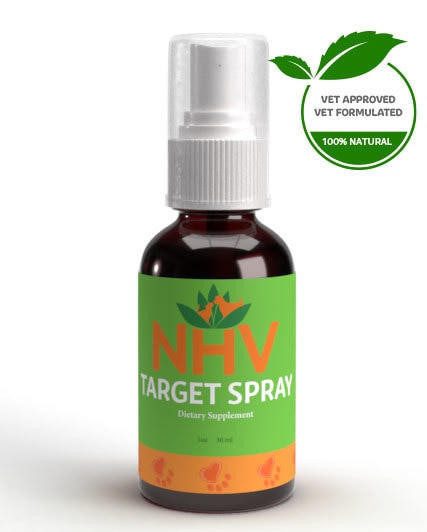
Holistic Tick & Flea Spray for Dogs
buy 2 and save $3
What is it?
This flea spray for dogs soothes bites as well as protects against future ones. Give your pet the best with a holistic flea and tick spray for your dog from NHV’s line of natural pet products.
How does it work?
Why trust it?
This flea spray for pets is made only from natural ingredients and has zero harmful pesticides.
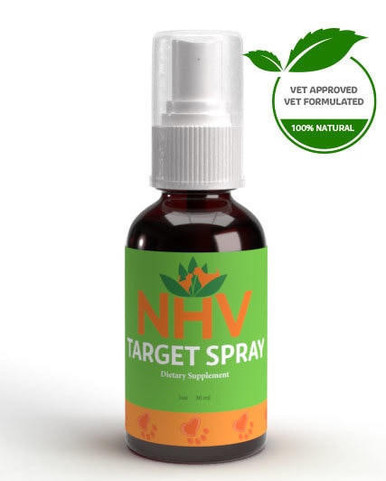
What is it?
This flea spray for dogs soothes bites as well as protects against future ones. Give your pet the best with a holistic flea and tick spray for your dog from NHV’s line of natural pet products.
How does it work?
Why trust it?
This flea spray for pets is made only from natural ingredients and has zero harmful pesticides.
Pest infestations in your dog can result in a lot more than irritated, itchy skin. Serious concerns like Lyme disease, anemia, intestinal parasites, and hair loss are just a few of the side effects your dog may experience if bitten by insects. Skipping proactive care like our flea spray for dogs does more than risk your pet’s health and comfort: it also risks yours. Prioritize pest prevention in your household today with Target Spray for dogs.
Target Spray helps reduce the uncomfortable symptoms of a bug bite thanks to its naturally soothing antiseptic, anti-inflammatory, antioxidant, anti-fungal, and astringent properties. Target Spray also utilizes numerous herbs, essential oils, and other natural ingredients to deter pests and prevent future bites from occurring.
Give your pets the proactive care they need with NHV’s line of natural pet products. Avoid irritated skin, hair loss, and allergy flare-ups in your pet with flea and tick spray for dogs.
Aloe Vera — Soothes skin and promotes healing of bug bites
Benzoin Gum — Contains antiseptic, expectorant, and astringent qualities
Celandine — Helps against microorganisms and can help reduce swelling and pain
Ceylon Citronella Oil — Contains antiviral and antibacterial qualities and helps deter pests
European Pennyroyal — A natural insect deterrent and helps alleviate itching
Lavender — Contains antiseptic and anti-inflammatory healing qualities and is a natural insect deterrent
Lemongrass Oil — Contains antibacterial, anti-inflammatory, and anti-fungal qualities and also acts as a natural insect and mite deterrent
Milk Thistle — Used topically helps soothe inflamed skin
Neem — Contains insect deterrent qualities and provides wound healing support
Rosemary — Is a natural insect deterrent and contains antiseptic, astringent, and anti-inflammatory qualities
Sweet Scented Marigold — Deter pests and contains astringent, anti-inflammatory, and pain-relieving properties
Tea Tree Oil — Contains antiseptic qualities and can help against microorganisms
How to Administer
Topical Spray: Spray several times a day as needed. It may sometimes be necessary to shave or trim your pet’s hair so that the Target spray reaches the affected area.
Caution
Do not spray near or into the eyes or nose. Do not use in pregnant animals.
Pest infestations in your dog can result in a lot more than irritated, itchy skin. Serious concerns like Lyme disease, anemia, intestinal parasites, and hair loss are just a few of the side effects your dog may experience if bitten by insects. Skipping proactive care like our flea spray for dogs does more than risk your pet’s health and comfort: it also risks yours. Prioritize pest prevention in your household today with Target Spray for dogs.
Target Spray helps reduce the uncomfortable symptoms of a bug bite thanks to its naturally soothing antiseptic, anti-inflammatory, antioxidant, anti-fungal, and astringent properties. Target Spray also utilizes numerous herbs, essential oils, and other natural ingredients to deter pests and prevent future bites from occurring.
Give your pets the proactive care they need with NHV’s line of natural pet products. Avoid irritated skin, hair loss, and allergy flare-ups in your pet with flea and tick spray for dogs.
Aloe Vera — Soothes skin and promotes healing of bug bites
Benzoin Gum — Contains antiseptic, expectorant, and astringent qualities
Celandine — Helps against microorganisms and can help reduce swelling and pain
Ceylon Citronella Oil — Contains antiviral and antibacterial qualities and helps deter pests
European Pennyroyal — A natural insect deterrent and helps alleviate itching
Lavender — Contains antiseptic and anti-inflammatory healing qualities and is a natural insect deterrent
Lemongrass Oil — Contains antibacterial, anti-inflammatory, and anti-fungal qualities and also acts as a natural insect and mite deterrent
Milk Thistle — Used topically helps soothe inflamed skin
Neem — Contains insect deterrent qualities and provides wound healing support
Rosemary — Is a natural insect deterrent and contains antiseptic, astringent, and anti-inflammatory qualities
Sweet Scented Marigold — Deter pests and contains astringent, anti-inflammatory, and pain-relieving properties
Tea Tree Oil — Contains antiseptic qualities and can help against microorganisms
How to Administer
Topical Spray: Spray several times a day as needed. It may sometimes be necessary to shave or trim your pet’s hair so that the Target spray reaches the affected area.
Caution
Do not spray near or into the eyes or nose. Do not use in pregnant animals.
flea & tick support
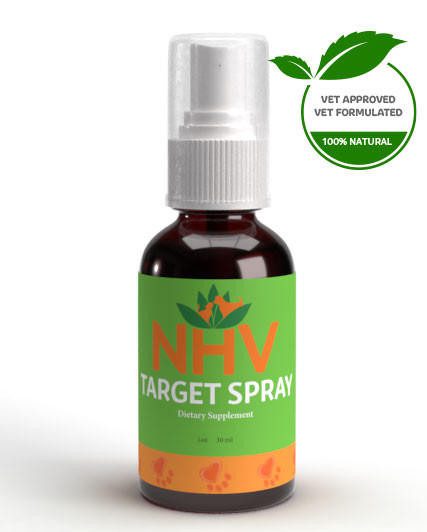
Effective Tick & Flea Spray for Cats
buy 2 and save $3
What is it?
A natural tick and flea spray for cats that deters fleas, ticks, lice, and mosquitoes with an herbal formula that is free of pyrethrins and other harmful chemicals.
How does it work?
Why should I trust it?
NHV Target Spray contains zero artificial ingredients, so your pet can benefit from the best nature has to offer.
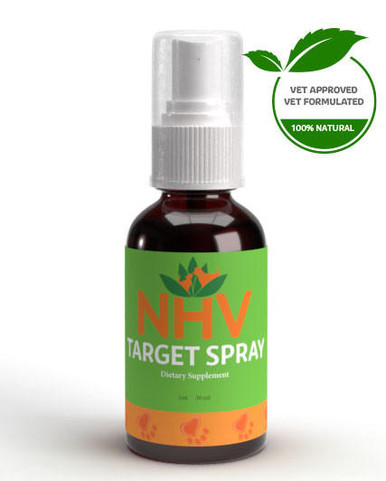
What is it?
A natural tick and flea spray for cats that deters fleas, ticks, lice, and mosquitoes with an herbal formula that is free of pyrethrins and other harmful chemicals.
How does it work?
Why should I trust it?
NHV Target Spray contains zero artificial ingredients, so your pet can benefit from the best nature has to offer.
In many animals, a pest infestation can cause more than an uncomfortable itch. Diseases, skin irritations, anemia, and intestinal parasites can be transmitted by the bite of a single parasitic insect. Exposure to fleas, ticks, and mosquitoes can harm both animals and humans, making pest prevention an important priority for any pet owner.
Target Spray utilizes numerous herbs, essential oils, and other natural ingredients to eliminate pests and soothe skin irritated by insects. This unique flea and tick spray for cats is made with antiseptic, anti-inflammatory, antioxidant, anti-fungal, and astringent properties that work to soothe irritation caused by flea and other insect bites. NHV’s Target Spray is a safe, holistic way to help deter and prevent fleas.
NHV’s line of natural pet products utilizes ethically-sourced non-GMO ingredients. Reduce uncomfortable skin irritation, hair loss, and allergy flare-ups in your pet with NHV’s flea and tick spray for cats.
Aloe Vera – Soothes irritated skin and promotes healing of bug bites
Benzoin Gum – Contains antiseptic, expectorant, and astringent properties
Celandine – Helps reduce swelling and pain, and can help against microorganisms
Ceylon Citronella Oil – Contains antiviral and antibacterial properties and helps deter pests naturally
European Pennyroyal – A natural insect deterrent and helps alleviate itching
Lavender – Contains antiseptic and anti-inflammatory properties and is a natural insect deterrent
Lemongrass Oil –Contains antibacterial, anti-inflammatory, and anti-fungal properties and also acts as a natural insect and mite deterrent
Milk Thistle – Used topically helps soothe inflamed skin
Neem – Contains insect deterring properties and provides wound healing support
Rosemary – Is a natural insect deterrent and contains antiseptic, astringent, and anti-inflammatory properties
Sweet Scented Marigold – Deters pests naturally and contains astringent, anti-inflammatory, and pain-relieving properties
Tea Tree Oil – Contains antiseptic properties and can defend against microorganisms
How to Administer
Topical Spray: Spray several times a day as need. It may some times be necessary to shave or trim your pet’s hair so that the Target spray reaches the affected area.
Caution
Do not spray near or into eyes or nose. Do not use in pregnant animals.
In many animals, a pest infestation can cause more than an uncomfortable itch. Diseases, skin irritations, anemia, and intestinal parasites can be transmitted by the bite of a single parasitic insect. Exposure to fleas, ticks, and mosquitoes can harm both animals and humans, making pest prevention an important priority for any pet owner.
Target Spray utilizes numerous herbs, essential oils, and other natural ingredients to eliminate pests and soothe skin irritated by insects. This unique flea and tick spray for cats is made with antiseptic, anti-inflammatory, antioxidant, anti-fungal, and astringent properties that work to soothe irritation caused by flea and other insect bites. NHV’s Target Spray is a safe, holistic way to help deter and prevent fleas.
NHV’s line of natural pet products utilizes ethically-sourced non-GMO ingredients. Reduce uncomfortable skin irritation, hair loss, and allergy flare-ups in your pet with NHV’s flea and tick spray for cats.
Aloe Vera – Soothes irritated skin and promotes healing of bug bites
Benzoin Gum – Contains antiseptic, expectorant, and astringent properties
Celandine – Helps reduce swelling and pain, and can help against microorganisms
Ceylon Citronella Oil – Contains antiviral and antibacterial properties and helps deter pests naturally
European Pennyroyal – A natural insect deterrent and helps alleviate itching
Lavender – Contains antiseptic and anti-inflammatory properties and is a natural insect deterrent
Lemongrass Oil –Contains antibacterial, anti-inflammatory, and anti-fungal properties and also acts as a natural insect and mite deterrent
Milk Thistle – Used topically helps soothe inflamed skin
Neem – Contains insect deterring properties and provides wound healing support
Rosemary – Is a natural insect deterrent and contains antiseptic, astringent, and anti-inflammatory properties
Sweet Scented Marigold – Deters pests naturally and contains astringent, anti-inflammatory, and pain-relieving properties
Tea Tree Oil – Contains antiseptic properties and can defend against microorganisms
How to Administer
Topical Spray: Spray several times a day as need. It may some times be necessary to shave or trim your pet’s hair so that the Target spray reaches the affected area.
Caution
Do not spray near or into eyes or nose. Do not use in pregnant animals.
Published: October 14, 2020